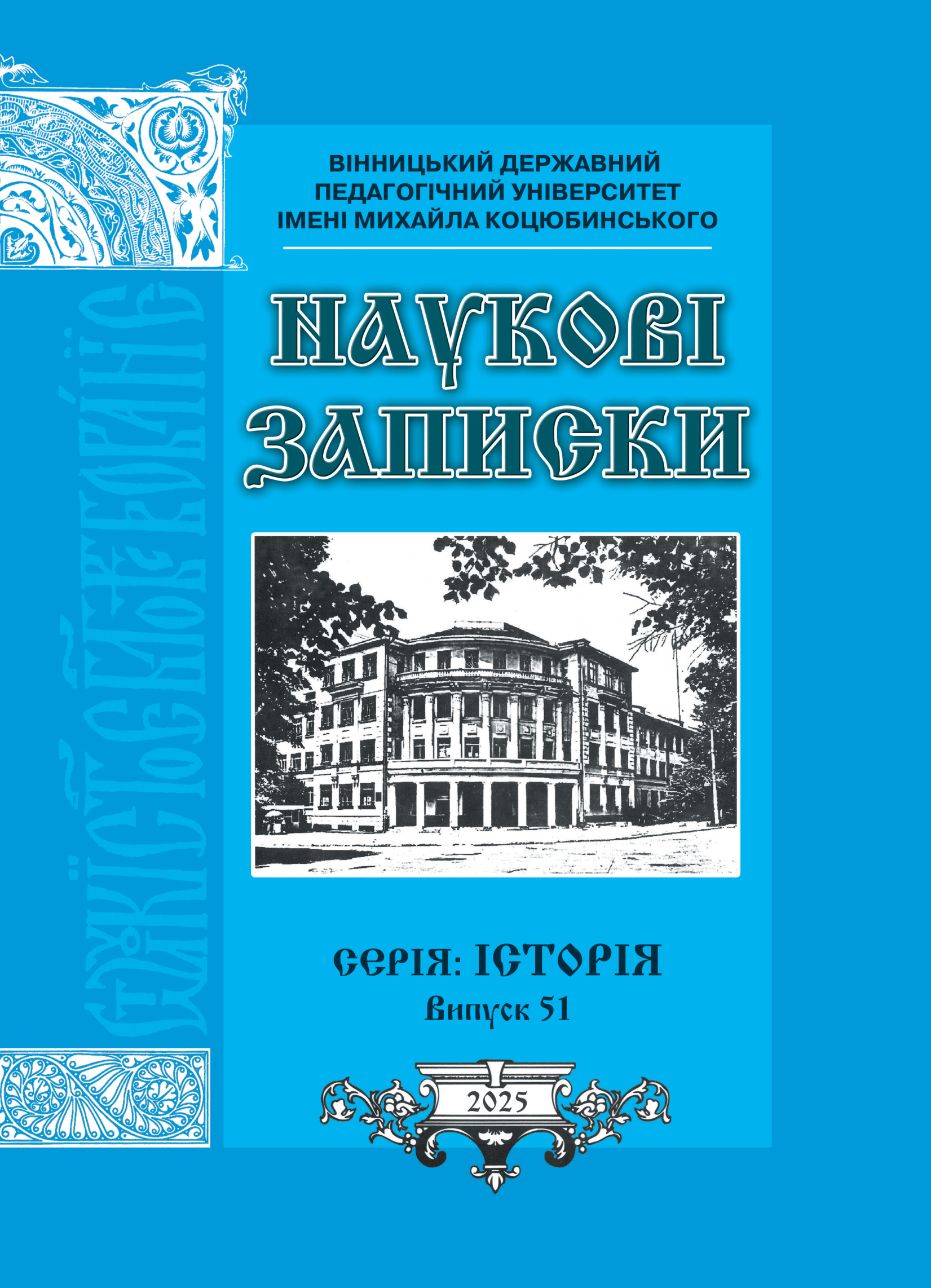Abstract
The purpose of the article is to analyse the moods and behaviour of Red Army soldiers during the campaign to eliminate kulaks as a class in Podillia during the period of continuous collectivisation. Research methodology. The study used historical (chronological, comparative, historical-genetic, historical-typological), source studies (analysis of archival documents, content analysis of the press and propaganda materials), socio-psychological (method of reconstructing a socio-psychological portrait, method of historical empathy) and statistical (quantitative analysis, method of sociometry) methods.The scientific novelty of the study is an attempt to trace the dynamics of the moods and behaviour of the Red Army during the campaign of liquidation of the kulaks in Podillia based on the analysis of previously classified archival documents. Conclusions. The decision taken by the party to move to a policy of ‘liquidation of the kulaks as a class’ in the areas of continuous collectivisation involved the united efforts of the party and Soviet bodies and law enforcement agencies to implement it. In the war declared by the Bolsheviks against the peasant owners, the authorities counted on the support of the Red Army, which was always seen as an important institution for the establishment of the communist regime. Military units stationed throughout Ukraine, including in Podillia, were tasked with suppressing peasant resistance by force if necessary. In view of this, the political departments of military units were tasked with closely monitoring the moral and political attitudes of the command and rank-and-file of the CA and their reaction to the practical implementation of the party's measures to eliminate the kulaks as a class. Political departments were obliged to systematically send information to the political department of the Ukrainian Military District and take the necessary measures. Foreseeing the negative reaction of the Red Army to the repressive measures against the peasantry, the political leadership of the UMD in its directives to military units proposed not only to strengthen ideological and political work among the personnel, but also to carry out ‘purges’ by removing from the army people from wealthy peasant families. It was proposed to create ‘operational bases of malicious anti-Soviet elements’ within military districts and to put special units of troops on alert. Red Army soldiers from rural areas were encouraged to write letters to their families to convince them of the correctness of the party's decision. In their letters to village councils, the soldiers had to specify the names of wealthy villagers, demanding the requisition of their property and eviction from their settlements. As a result of propaganda activities, combined with political violence against Red Army soldiers from wealthy peasant families, the number of open protests by Red Army soldiers significantly decreased. In general, the moods and behaviour of the Red Army were ambiguous and depended on many factors, including personal beliefs, social background, party affiliation, and the nature of propaganda work among the military.
References
Бем, Н. (2003). Ставлення українського селянства до ліквідації куркульства як класу та суцільної колективізації сільського господарства (1930-1931 рр.). Проблеми історії України: Факти, судження, пошуки: Міжвідомчий збірник наукових праць. К., 9. С.227-242.
Бем, Н. (2004). Політичні настрої українського селянства в умовах колективізації сільського господарства (історіографічний огляд). Проблеми історії України: Факти, судження, пошуки: Міжвідомчий збірник наукових праць. К., 11. С.494-507.
Гриневич, Л. (2000). Рефлексії Червоної армії на колективізацію і голод в Україні (1932-1933 рр. Голод-геноцид 1933 р. в Україні: історико-політологічний аналіз соціально-демографічних та морально-психологічних наслідків. Матеріали міжнародної науково-теоретичної конференції. К., 191-217.
Гриневич, Л. (2003). Червона армія і українське суспільство під час кампанії ліквідації куркульства як класу (зима – весна 1930): історіографічний аналіз соціальної психології та поведінки. Проблеми історії України: Факти, судження, пошуки: Міжвідомчий збірник наукових праць. К., 7. С.285-298.
ДАВіО – Державний архів Вінницької області.
Дровозюк, С. (2004). Соціально-політичні настрої українського селянства у 20 – 30-х рр. ХХ ст. Проблеми історії України: Факти, судження, пошуки: Міжвідомчий збірник наукових праць. К., 12. 70-83.
Мельничук О. А. Кравченко П. М. (2024). Участь червоноармійців у проведенні суцільної колективізації на Поділлі. Наукові записки Вінницького державного педагогічного університету імені Михайла Коцюбинського. Серія: Історія. 48. 75-82. https://doi.org/10.31652/2411-2143-2024-48-75-82
Мельничук О. А. (2016). Ставлення червоноармійців до більшовицьких перетворень в подільському селі наприкінці 1920-х рр. Вінниччина: минуле та сьогодення. Краєзнавчі дослідження. Вінниця, 283-289.
Мельничук, О. А. Мельничук, Т. А. (2021). Утвердження більшовицького тоталітарного режиму в подільському селі наприкінці 1920-х – початку 1930-х рр.: причини, технології та наслідки (на прикладі села Мельниківець на Вінниччині). Наукові записки Вінницького державного педагогічного університету імені Михайла Коцюбинського. Серія: Історія. 35. 56-68. https://doi.org/10.31652/2411-2143-2021-35-56-68
Подкур, Р., Васильєв, В., Кравченко, П., Петренко, В. (упорядн.) (2013). Настрої та поведінка населення Поділля в умовах сталінської революції «згори». 1928-1940. Збірник документів та матеріалів. К.: Інститут історії України НАН України, 528 с.
Романо Андре, Тархова Нонна (1996). Красная армия и коллективизация деревни в СССР (1928-1933 гг.). Сборник документов из фондов РГВА. Неаполь, 540 с.
Тархова, Н. С. (2006). Армия и крестьянство. Красная Армия и коллективизация советской деревни 1928-1933. М.; СПб.: Летний сад, 260 с.

This work is licensed under a Creative Commons Attribution 4.0 International License.
Copyright (c) 2025 Олег Мельничук, Максим Мельничук





